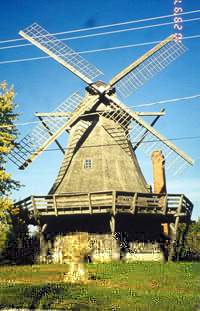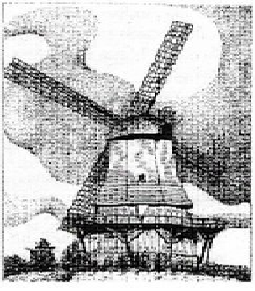The Windmill in Peotone, Illinois was constructed by the same craftsman who built the Tinley Park Windmill
The Rathje Mill 1872
427 W. Corning Avenue
P.O. Box 87
Peotone, IL 60468-0087
|  |

H. A. Rathje’s Peotone Mill History
The Village of Peotone was established in 1856 on the windswept prairie of Illinois and soon grew to become a farming community. There were no reliable sources of water available to provide the power needed for grinding grain. During the latter part of the 19th Century the widespread use of electricity had not yet been established in this area and an efficient way of grinding grain was needed.
Although Henry A. Rathje is credited with building the windmill, it was his father, Frederick, together with Christoph Elling, who agreed to construct the mill. This information is found on a warranty deed dated July 3, 1871. According to an 1873 reference in "Combination Atlas Maps of Will County Illinois", the "wind grist mill was erected in 1872 by Messrs. Elling & Rathje and contains two run of stones, and is doing a successful and satisfactory business". An account of the Rathje family contained in the 1900 Genealogical and Biographical Record of Will County, Illinois states; "In 1874 he (H. A. Rathje) married Miss Wilhelmina Luhmann, a native of Hanover (Germany). After his marriage he engaged in the milling business, acquiring the grist mill at Peotone, a wind mill, which he operated for twelve years." A recently discovered copy of an actual mill invoice states that Henry's business was established in 1874 and lists him as proprietor.
When the mill came into production it provided a variety of grain products such as fine wheat flour, rye flour, buckwheat flour and cornmeal. The mill was also a primary source of feed for the local livestock industry.
The busiest time of the year for the mill was in the fall when people would stock up for the winter with the freshly ground grain products. The average order would be three or four barrels of white flour, one hundred pounds of pancake flour, and a large bag of cornmeal. The surplus was stored in a building that was formerly attached to the west side of the H. A. Rathje Mill.
The mill made its revenue from charging a "toll" which was a fraction of the finished product. The mill had to comply with several state statutes detailing the toll to be charged for each type of grain product and there was a penalty for non-compliance.
We know from an account in the Peotone Eagle newspaper that in 1885 the mill was changed from wind power to steam. Oral Rathje history speaks about the great sails becoming rotten as the reason for the change to steam. The actual year the mill closed its doors for business is a fact we do not know at this time. We suspect that the mill ceased operation in the late 1880's, somewhere around 1889. We do know from the account in the "Genealogical and Biographical Record of Will County" that by 1900 "the substitution of modern methods in other mills rendered the mill unprofitable to its owner and it was abandoned; but it still stands, a picturesque reminder of other days".
For many years the mill stood in silent splendor while general maintenance was performed by Henry's son, Paul W. Rathje. Paul W. Rathje had two children, Paul and Helen. The mill was eventually passed to Paul Conrad Rathje, Henry's grandson, and he recognized that the mill was an important historic structure. Paul decided to donate the mill, and the land upon which it stands, to the village of Peotone in 1982. Helen Bieronski, H. A. Rathje's granddaughter, resides in the Rathje home located just west of the mill. The Peotone Mill is now listed on the National Register of Historic Places and the Will County's Register of Historic Places.
Restoration of the H. A. Rathje Mill
The Peotone Historical Society has undertaken the task of restoring the mill to its original working condition. The project has been divided into a number of phases and maintenance and restoration continues with the help of items purchased from the historical society, donations and memorials. The PHS is also seeking grants so this worthwhile project can be accomplished.
Tours
The Peotone Historical Society welcomes group tours by interested parties. We invite you to observe the progress in the restoration and see the mill first-hand. Reservations may be made in advance by writing to:
The Peotone Historical Society
427 West Corning Avenue
P. O. Box 87
Peotone, Illinois 60468











